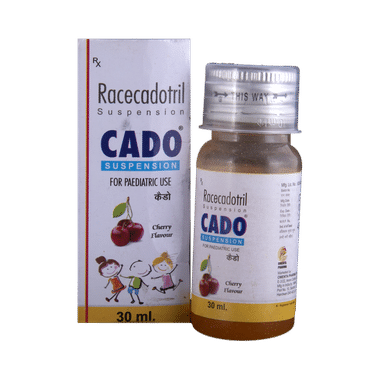-
Loo-Chek Oral Suspension Mango (Rs.49.69)
Composition: Racecadotril (10mg/5ml)
-
Glosika Syrup (Rs.56.25)
Composition: Racecadotril (10mg/5ml)
-
Loo Chek Oral Suspension (Rs.49.69)
Composition: Racecadotril (10mg/5ml)
-
Loo Chek Suspension (Rs.53)
Composition: Racecadotril (10mg/5ml)
-
Rale Syrup (Rs.60.41)
Composition: Racecadotril (10mg/5ml)
All Details About Cado Suspension
Find out detailed description, uses, directions of use, side effects, warnings and precautions, frequently asked questions about Cado Suspension
Description:
Cado Suspension is a commonly prescribed medicine for the symptomatic treatment of acute diarrhea in infants and children. This medicine is usually given when diarrhea cannot be treated effectively with fluids and dietary measures. It reduces the amount of water and salts that are lost in the stools.Donate Cado Suspension to your child orally either before or after food, preferably in addition to ORS (oral rehydration solution). Usually, it is given three times a day, but this dose will vary depending upon the child's body weight and age. If your child vomits within 30 minutes of taking Cado Suspension, repeat the same dose once your child feels better. Along with taking this medicine, your child needs to drink plenty of fluids and eat a healthy balanced diet.
This medicine may cause some minor and short-term side effects such as headache, skin rash, and constipation. These episodes are temporary and subside on their own once the child’s body adapts to the medicine. However, in case they persist for long or start bothering your child, you must consult your child’s doctor without any delay.
Your child’s doctor must be aware if your child has ever had any previous episode of allergy, bowel obstruction, electrolyte imbalance, liver impairment, and kidney malfunction. This will guide the doctor in planning your child’s overall treatment.
Uses:
Directions For Use:
Take this medicine in the dose and duration as advised by your doctor. Check the label for directions before use. Measure it with a measuring cup and take it by mouth. Shake well before use. Cado Suspension is to be taken with food.Side Effects:
Cado Suspension does not pose serious side effects and is well-tolerated by children. In case the side effects do occur, they’re likely to subside once the body adapts to the medicine. Consult your child’s doctor if these side effects persist or bother your child. The most common side effects include-Ordinary side effects of Cado
- Skin rash
- Vomiting
- Dizziness
- General discomfort
- Headache
Warning & Precautions:
FAQs:
Does Cado Suspension reduce stool output?
How long does Cado Suspension take to work?
My child is one year old and is suffering from a neurological disorder. Is it safe to give Cado Suspension?
My child has milk intolerance. Can I give Cado Suspension to my child?
My child is passing watery stools mixed with blood and is also suffering from fever. Is Cado Suspension the right choice of treatment?
My child is suffering from long-term (chronic) diarrhea. Can I give Cado Suspension?
What all other medicines should my child avoid while taking Cado Suspension?
Written by:
Dr. T. Sharmila Krishna
M.B.B.S., MD (Biochemistry)
Reviewed by:
Dr. Sureshbabu Yadav
M.B.B.S., DIP.DIAB, F.R.S.H
Disclaimer:
Getomeds primary intention is to ensure that its consumers get information that is reviewed by experts, accurate, and trustworthy. The information and contents of this website are for informational purposes only. They are not intended to be a substitute for professional medical advice, diagnosis, or treatment. Please seek the advice of your doctor and discuss all of your concerns about any disease or medication. Do not disregard or postpone seeking professional medical advice because of something you read on Getomeds. Our mission is to support, not replace, the doctor-patient relationship.
